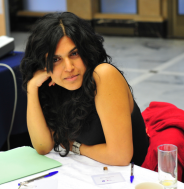Climate Change
Culture, Heritage & Community Conservation
Societal Challenges
Climate Adaptation & Resilience
Discrimination & Human Rights
Migration & Refugees Studies
Social Justice & Equity
Ph.D
United Kingdom
2010.09.30
Political Environment: The Impact of Climate Change on Politics in South Asia
Pakistan is a country going through numerous political challenges due to disasters and conflict. Yet things could get worse: what if militant Islamist groups were to win the country’s next elections? Indeed, climate change is increasing the frequency of disasters, paralyzing the government and increasing support for radical ethnic and religious groups in post-disaster Pakistan. After two years working as a consultant specializing in the socioeconomic consequences of climate change, Ayesha Siddiqi is now studying its impact on politics in South Asia. She is addressing three key questions, which are all but absent from academic literature: how climate-related disasters are impacting religious and ethnic politics in Pakistan; how ethno-national and religious politics are able to use the discourse on climate change to meet their own goals; and finally, how this affects the political stability of the region.
Ayesha has a background in development and obtained an MA in Poverty and Development with a specialisation in Climate Change from the Institute of Development Studies (IDS) in Sussex. She then spent two years working as a climate change consultant with one of the leading energy and climate change consulting companies in the UK. During this time she worked on a number of projects providing consulting advice to governments on climate change policy, including the Government of Tajikistan on a project under the multi-donor Climate Investment Funds (CIFs). Ayesha’s doctoral project examines the impact of climate and environment change on political conflicts in South Asia. She is based in the War Studies department at King’s College London and is working under the supervision of the Geography Department as well.
When climate change shapes political speech
What has your AXA fellowship brought you?
The AXA fellowship is enabling me to pursue my life-long dream of working on my Doctoral project in one of the best institutions in this area. While reading for my MA degree, I was privileged to be part of a buoyant graduate community and to learn from and engage in debate with accomplished experts in the form of my teachers. This experience and my genuine interest in my subject area of political conflict and climate change made me very certain that I wanted to pursue a PhD. Despite my resolve and willingness to work hard in pursuing this professional path, the odds were stacked against me. As a Pakistani citizen living in the UK, I was not eligible for UK government research grants or funds, and because I had been living outside Pakistan for many years, I could not apply for Pakistani funding either. I had been struggling to find adequate funding for two years before I received the AXA award – the reason that today I am able to work towards my PhD. I have been very fortunate to have a supportive and brilliant supervisor. I have been accepted into the programme of my choice and have overcome a number of cultural and societal barriers to get to this point. However, without the support of the AXA fellowship this could have all been in vain.
Could you describe your experiences with the AXA Research Fund community?
I had the opportunity to meet with other AXA fellows and the AXA Research Fund Team only a couple of months into my PhD, and it was fantastic. I participated in the Talent Day on environmental risks, held in Paris on 22-24 November 2010. The event gave me a chance to learn more about what other fellows were doing, as well as share ideas and generally socialise with them. The AXA Research Fund Team, especially Isabelle and Jean-Victor, went out of their way to take care of all management issues associated with this event and to make our time in Paris as useful and comfortable as possible. I immediately felt a sense of belonging and inclusiveness within weeks of starting the PhD, and I am certain that these bonds will continue well after I have completed my PhD.
Can you briefly describe what your research project is about?
My research aims to examine the impact of climate change as it is likely to play out in politics in South Asia. An analysis on how climate change issues and discourses are used to drive politics is all but absent in academic literature to date. My PhD project attempts to address three key questions: i) how the changing environment is impacting ethnic politics in Pakistan; ii) how ethno-national politics will be able to use the climate change discourse to meet their own ends; and iii) what this will mean for security in the region and for the future of Indo-Pak relations.
To add or modify information on this page, please contact us at the following address: community.research@axa.com

Ayesha
SIDDIQI
Institution
King's College London
Country
United Kingdom
Nationality
Pakistani
Related articles
Climate Change
Finance, Investment & Risk Management
Societal Challenges
Climate Adaptation & Resilience
Insurance & Risk Management
Environmental Justice
Civil Society & Governance
AXA Project
Italy
AXA Research Lab on Climate Change, Risk and Justice
In response to three research questions: How can the private and financial sectors contribute to a just transition to a... Read more

Gianfranco
PELLEGRINO


